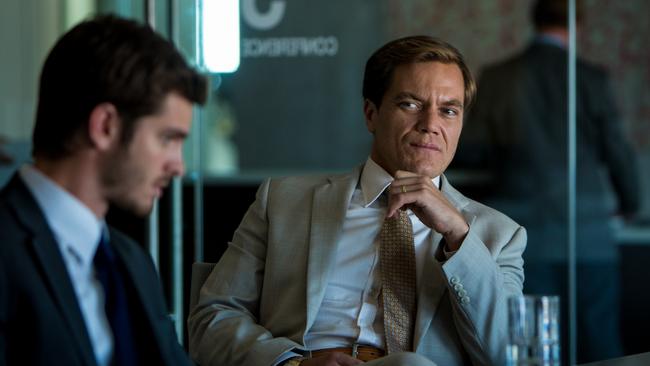99 Homes: America’s mortgage meltdown as Hollywood thriller
Ramin Bahrani wanted to capture the mortgage meltdown — yet still sell tickets to a mass audience.

The latest thriller from Hollywood finds its tension in an unlikely setting: the foreclosure crisis in Florida, where shiny McMansions turned into a financial quagmire for everyone involved.
99 Homes, which premieres in limited release in the US this week, is Hollywood’s first major treatment of the American housing collapse that accompanied the 2008 financial crisis, looking at the impact on everyday people.
But for a movie where key plot points hinge on contract signatures, 99 Homes is presented as a tense thriller about a Faustian bargain that seems headed toward disaster.
The film’s writer and director, Ramin Bahrani, wanted a movie that would capture the reality of lives ruined when the financial system went haywire — yet still sell tickets for a mass audience.
“If this was an agenda film, you would have been bored out of your mind,” Bahrani says.
In the film, Andrew Garfield plays a laid-off construction worker who ends up in the employ of the ruthless real estate magnate, portrayed by Michael Shannon, who evicted him from his home.
The protagonist gets deeper into the dangerous job of cheating banks and serving eviction notices, all while trying to raise enough money to move his family out of a motel room and back into their foreclosed house.
99 Homes premiered to solid reviews at film festivals last year and was picked up for distribution at the Toronto International Film Festival for about $3 million by Broad Green Pictures. “This is tough subject matter,” says Gabriel Hammond, chief executive of Broad Green Pictures, a 36-year-old who made his fortune in finance before coming to Hollywood.
99 Homes was the first major acquisition by Broad Green, a production company started last year by Hammond and his brother Daniel.
The Hammonds are still partners at Dallas-based Alerian Capital Management, which has about $20 billion in linked assets and specialises in the energy sector.
Resistance to the film from banks or financiers “wasn’t part of our calculations” in making the acquisition, Gabriel Hammond says. The movie had a budget of about $5m.
Hollywood doesn’t always wait several years to dramatise major news events, but studios have found it tough to turn dialogue about credit-default swaps into popcorn-friendly features. Most treatments of the recession have been documentaries or based on journalistic accounts such as Inside Job, Too Big to Fail and The Queen of Versailles.
The fictional film Margin Call received favourable reviews when it came out in 2011, though it grossed only $5.4m in limited theatrical release. In December, Paramount Pictures will release its adaptation of Michael Lewis’s The Big Short, starring Christian Bale and Brad Pitt as bankers who anticipated the collapse.
While the movie was filmed in New Orleans, Bahrani conducted a reconnaissance tour to Florida before writing the script. Visiting Florida’s hardest hit communities in 2012, he found a dire situation that belied news reports that the worst of the crisis had passed.
Some elements in his original screenplay proved too hot to pursue: a week before filming began, the movie’s insurer made him scrub the script of specific bank names. “And I had the worst ones in certain scenes,” he says.
Several of the stories he heard are dramatised in the film, such as a senile homeowner with no one to call for help, and an evicted owner who backed up the home’s sewage system so a mess was waiting for the eviction crew. He went to the motels where evicted families often stay, sometimes in such large numbers that local school districts had to adjust bus routes.
Many of the eviction scenes in 99 Homes feature non-professional actors, including a sheriff’s deputy who leads evictions in real life and a clean-up crew who make their living moving furniture and mementos out of foreclosed homes. Many of the real estate agents whom Bahrani shadowed carried guns for personal protection in case a homeowner got out of hand — a detail the director reflected in Shannon’s character.
Helping him navigate the world was Lynn Szymoniak, a whistleblower and housing advocate who in 2010 helped uncover fraudulent “robo-signing” practices at major mortgage companies. Szymoniak, who was part of a multi-million-dollar settlement against the companies and now runs the Florida-based Housing Justice Foundation, took Bahrani to “rocket docket” courtrooms that quickly cycle through mortgage cases.
Though 99 Homes focuses on the human toll of the mortgage crisis, Bahrani was adamant in keeping the film from assigning specific blame for the meltdown. In 99 Homes, he says, the foreclosure mess becomes a system that is impossible for the unemployed day labourer or the wealthy real estate titan to escape.
The Wall Street Journal


